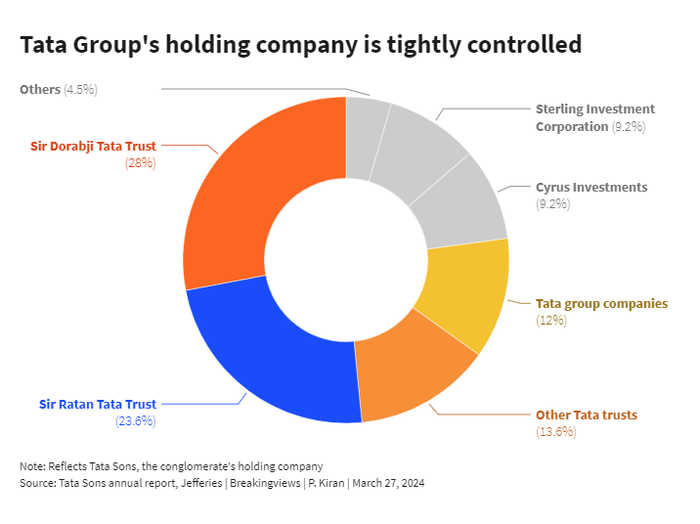Published 13:41 IST, October 10th 2024
Ratan Tata leaves more to India than its tycoons
Some of Tata’s biggest initiatives to tap global growth were painful to digest, however. Under his leadership, the group spent heavily on cross-border deals.
- Companies
- 3 min read

Omnipresent. Ratan Tata is synonymous with the rise of India Inc and the Tata group, the country’s oldest and most celebrated conglomerate. He put a kind face on capitalism in a country emerging from socialism, and his death at the age of 86, ushers in a new era of shrewder tycoons.
The scion took the reins as chair of Tata in 1991, a few months before India airlifted gold to secure an International Monetary Fund loan and liberalised its economy. The salt-to-tea conglomerate expanded rapidly, and the value of its listed companies rose to $84 billion over Ratan Tata’s more than two-decade tenure. That laid the foundation for future growth: nearly 30 listed companies, including IT services behemoth Tata Consultancy Services which he took public, had a market capitalisation of $365 billion in March.
Some of Ratan Tata’s biggest initiatives to tap global growth were painful to digest, however. Under his leadership, the group spent heavily on cross-border deals. The $13 billion acquisition in 2006 of Anglo-Dutch Corus saddled Tata Steel with debt. Iconic luxury British marques Jaguar Land Rover bought by Tata Motors in 2008 for $2.3 billion lost money for years. At home, his Tata Nano, billed as the world’s most affordable car with a launch price of $1,300, was a worthy but unsuccessful idea; Indian consumers had grand, not cheap, aspirations. He backed those ambitions more astutely in later years as a prominent investor in startups.
The industrialist’s influence endured long after he formally handed over the reins too. He remained chairman of Tata Trusts, India’s oldest philanthropic organisations. Through their control of Tata Sons, the conglomerate’s holding company, he loomed large. Tata regained ownership of Air India from the government in 2022, nearly seven decades after it was nationalised; that is another large acquisition the patriarch championed, and one that could yet become another financial burden.
Ultimately, his lingering influence contributed in 2016 to the abrupt ouster of his successor, the late-Cyrus Mistry, who tried to shed assets Ratan Tata helped purchase. Former TCS boss Natarajan Chandrasekaran, who was elevated as executive chairman of Tata Sons in 2017, has followed through on the repair work to “stop the bleeding” by cutting debt, improving profitability and entering new businesses including semiconductor manufacturing.
Ratan Tata’s death will reshape the group in the long term. The new era of industrialists that dominate India's nearly $4 trillion economy are financially shrewder but less universally admired.

Context News
Ratan Tata, the former Tata Group chair, has died, the Tata Group said in a statement late on Oct 9. He was 86. Tata, who led the conglomerate for more than 20 years, had been undergoing intensive care in a Mumbai hospital, two sources with direct knowledge of his medical situation told Reuters.
Updated 13:41 IST, October 10th 2024